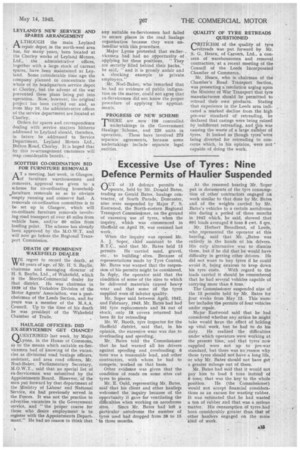Excessive Use of Tyres : Nine Defence Permits of Haulier Suspended
Page 17

If you've noticed an error in this article please click here to report it so we can fix it.
OUT of 15 defence permits to operate, held by Mr. Don,ald Bates, trading as Gerald Bates, haulage contractor, of South Parade, Doncaster, nine were suspended by Major F. S. Eastwood. the North-eastern Regional Transport Commissioner, on the ground of excessive use of tyres, when the inquiry, which was commenced in Sheffield on April 19, was resumed last week.
When the inquiry was opened Mr. A. J. Soper, chief assistant to the R.T.C., said that Mr. Bates held 15 permits. He carried sand, gravel, etc , to building sites. Because of representations made by Tyre Control, Mr. Bates was warned that the suspension of his permits might be considered. In teply, the operator said that the cOndithin of some of the sites to which he delivered materials caused heavy wear and that some of the tyres supplied were of inferior quality.
Mr. Soper said between April, 1942, and February, 1943, Mr. Bates had had 101 tyre replacements and 34 out of stock; only 18 covers returned bad been fit for retreading Mr. W. Booth, tyre inspector for the Sheffield district, said that, in his opinion, the excessive wear was due to overloading and speeding.
Mr. Bates told the Commissioner that he had warned all his drivers against speeding and overloading; 6 tons was a reasonable load, and other contractors, with whom he had to compete, worked on that basis.
Other evidence was given that the condition of roads on some sites cut tyres to pieces.
Mr. E. Ould, representing Mr. Bates. said that his client and other hauliets welcomed the inquiry because of the opportunity it gave for ventilating the difficulties when working on aerodrome sites. Since Mr. Bates bad left a particular aerodrome the number of tyres used had dropped from 38 to 15 In three months.
At the resumed hearing Mr. Soper put in documents of the tyre consumption of other contractors engaged on work similar to that done by Mr. -Bates and of the weights carried by Mr. Bates's vehicles to a certain aerodrome site during a period of three monthe in 1942 which, he said, showed that 691 loads averaged 6 tons 8 cwt. 3 qrs.
Mr. Herbert Broadbent, of Leeds, who represented the operator at this hearing, said that Mr. .Bates was entirely in the hands of his drivers. His only alternative was to dismiss them, but if he did that he would have difficulty in getting other drivers. He did not want to buy tyres if he could avoid it, being anxious to keep down
his tyre costs. With regard to the loads carried it should be remembered that he had several vehicles capable of carrying more than 6 tons.'
The Commissioner suspended nipe of the 15 permits held by Mr. Bates for f our weeks from May 15. This number includes the permits of four vehicles under repair.
Major Eastwood said that he had considered whether any action he might take would have the effect of holding up vital work, hut he had to do his duty. He realized the difficulties under which operators were working at the present time, and that tyres' now supplied were not up to pre-war standard, but there was no reason why those tyres should not have a long life, or why Mr. Bates should not have got a greater mileage out of them.
Mr. Bates had said that it would not pay bim to load 5 tons instead of 6 tons; that was the key to the whole position. He (the Commissioner) would not accept financial considerations as an excuse for wasting rubber. It was estimated that he had wasted a ton of rubber and that was a serious matter. His consumption of tyres had been considerably greater than that of other hauliers engaged on the same kind of work.




















































